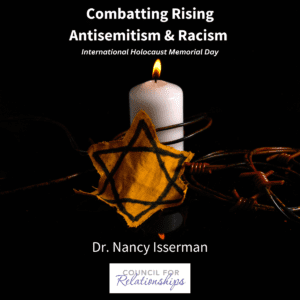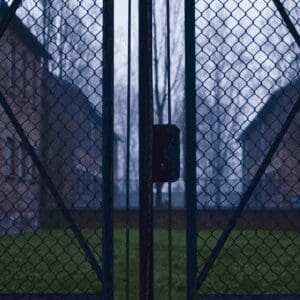Combatting Rising Antisemitism & Racism this International Holocaust Memorial Day
 Commemorating Holocaust Memorial Day
Commemorating Holocaust Memorial Day
January 27, 2023, is International Holocaust Memorial Day, commemorating the 78th anniversary of the liberation of the Auschwitz-Birkenau concentration camp in Poland. The Auschwitz-Birkenau concentration camp is a stark symbol of a 14-year campaign by the Nazis and their collaborators to murder all the Jews in Europe. The day also commemorates those killed in more recent genocides such as in Cambodia, Rwanda, Bosnia, and Darfur.
Ordinary people, extraordinary evil
The theme for this year’s International Holocaust Remembrance Day is “ordinary people.” The genocide that was instigated by the Nazis was fueled by ordinary people. These people turned a blind eye to what they saw happening around them. They also turned a blind eye to what they were asked to do by the leaders of their countries.
The people who were the victims of the Nazi genocide were also ordinary people, persecuted only because they were members of a particular group, (e.g. Roma, Tutsi, Jews). “Ordinary people” were involved in the Holocaust as victims, bystanders, rescuers, and persecutors as they were in subsequent genocides against Cambodians, Rwandans, Bosnians, Darfur, Uyghurs, and others.
The Holocaust Memorial Day Trust, the charity that promotes and supports Holocaust Memorial Day, who designated the 2023 theme as “ordinary people” hopes that this theme will help us to consider how ordinary people can “perhaps play a bigger part than we might imagine in challenging prejudice today.”
Council for Relationships’ Transcending Trauma Project (TTP) has researched the factors and influences on prejudice. TTP findings might suggest ways to challenge prejudice. Since 1993, TTP has conducted in-depth interviews of intergenerational survivor families focusing on their belief systems, deepest feelings, faith experiences, and values.
 Antisemitism is on the rise
Antisemitism is on the rise
As noted on a November 30, 2022, podcast on NPR, 2021, the latest year that data was analyzed, was the highest year on record for documented reports of harassment, vandalism, and violence directed against Jews, according to the Anti-Defamation League (ADL). These record-breaking numbers are also part of a period of 5-6 years of unprecedented and consistent increases in the 30-plus years of the ADL surveys. These incidents have ranged from mass shootings in synagogues to vandalizing Jewish schools and community centers, attacking Jews on public streets, and extremist public statements such as “death con to Jews.”
Why is this a troubling situation as it applies only to about 2.4% of the US population? Experts refer to antisemitism as “the canary in the coal mine.” In the same NPR podcast, NPR reporter, Lisa Hagen reported that,
“If any minority group is being blamed for some real or perceived harm, those narratives usually find ways to also attack Jews based on centuries-old myths. Sometimes, someone can be upset about Black people demonstrating about racism. You can blame a pandemic on anyone who looks Asian. Or if you’re angry about the visibility of transgender people and queer culture, it’s a pretty short leap to conspiracy thinking.”
Emily Snider, antisemitism specialist at ADL added,
“Jews are centered in a lot of conspiracy theories, especially around economy or power or greed which serve as core antisemitic tropes. When we start to see unrest, we tend to see anti-Semitic incidents climb…the more commonplace antisemitism becomes, the more fertile the ground gets across the country for all kinds of hate, along with the potential for real violence.”
Coping with extreme trauma
TTP has conducted 307 in-depth life histories with 98 Holocaust survivors and their children and grandchildren to better understand coping and adaptation after extreme trauma. The project contains 1,200 hours of in-depth life history interviews which have been preserved as digital archived files. They form the Phil Wachs and Juliet Spitzer Archive of the Transcending Trauma Project housed at the U.S. Holocaust Memorial Museum and Yad Vashem.
In the TTP research, when asked the question, “Does the Holocaust affect your political views?” a surprising number of survivors clearly stated that they do not harbor any hatred toward the national groups that perpetrated crimes against them and their families.
Irrespective of their experiences during the Holocaust, about one third of the survivors in the sample were able to separate out their emotional responses toward the perpetrators of the specific crimes against them from their views of all Germans, Poles, or other groups that collaborated with the German Nazi government. On the other hand, about the same number of survivors expressed hatred toward their perpetrators and the entire national or ethnic groups that participated in the destruction of their families and their lives.
 Threatening or unthreatening world for children of Holocaust survivors?
Threatening or unthreatening world for children of Holocaust survivors?
What specifically were the relevant TTP findings? Prewar stories revealed the importance of family-of-origin relationships in forming political beliefs of tolerance and intolerance. TPP research revealed that unlike tolerant survivors, survivors who were intolerant perceived the world to be a threatening place, which they verbalized by stating that they expected another Holocaust to happen. These intolerant survivors, who had troubled relationships with their family-of-origin caregivers, expressed intolerance toward the perpetrators of the crimes against them and towards all groups, other than Jews.
Conversely, TTP research found that individuals who experienced secure attachments, defined as an attachment where a child feels comforted and protected by the presence of their caregiver in their family of origin, usually found themselves in satisfying and committed adult relationships . These relationships allowed them to view potentially negative events in a less-threatening way. Thus, the attachment relationship which is positive and supportive between the child and their primary caregivers creates for the child a worldview that governs their interactions with others who hold different beliefs, values, and worldviews.
 Protection from threats to worldviews
Protection from threats to worldviews
People who have experienced positive relationships with their primary caregivers are more secure and have higher self-esteem. These feelings partly protect them against threats to their worldview and feelings of vulnerability. Positive feelings of self-worth create individuals who have developed effective ways of controlling their emotions and positive models of themselves and others. As a result, people who have experienced positive relationships with their parents or caregivers tend to be more open and less defensive around people who are different in values, lifestyles, ethnic, national and racial identities. Conversely, the intolerant survivors who have experienced less-secure or negative relationships with their primary caregivers more strongly defend their worldview against any threats, and are less tolerant of others who differ from them.
The data showed that intolerant survivors’ interviews contained fewer stories of positive healthy relationships than the interviews of tolerant survivors. In the intolerant survivor group the number of the negative narratives about family relationships equaled the number of the positive narratives. The overall number of narratives, positive or negative, was low. It is as if the survivors in the intolerant group did not have many positive stories to share, so they were less inclined to share any stories, negative or positive.
 Forming secure ties between parents and their children
Forming secure ties between parents and their children
Quite a different picture came from analyzing the interviews in the tolerant survivor group. In their narratives, stories of positive family relationships were numerous, and the narratives concerning negative relationships were much fewer. The stories revealed that tolerant survivors formed secure ties to their caregivers, which were reflected in their relationships not only with family members but also toward others. The empathy, validation, and expressions of positive emotions that these survivors received, especially from their parents, gave them the capacity to have greater empathy for others. One manifestation of this empathy was the development of an attitude of tolerance for others outside their own group.
These findings suggest ways to challenge prejudice. In the mental health field, working with clients to improve the quality of relationships between parents and their children are key areas of focus for therapists. Making the child’s world more secure, developing in the child positive self-esteem, and encouraging the acceptance of people who are different from them will hopefully lead to adults who are tolerant towards others who hold different beliefs, who look different, and who practice different lifestyles. In the areas of both adult and child education, a focus on fostering acceptance towards those who are different and thus ameliorating fears towards them, has additional possibilities.
 Our charge this Holocaust Memorial Day
Our charge this Holocaust Memorial Day
Whether the solutions come from TTP research or from another arena, our charge, as we observe the International Holocaust Memorial Day, remembering the hatred and bigotry that manifested itself in places like the Auschwitz death camps, is to work towards decreasing prejudice and bigotry. We must promote the growth of tolerance for and by the “ordinary people” of the world towards all groups of people.
Learn more about CFR’s Transcending Trauma Project.
Nancy Isserman, MSW, PhD, is Director of Operation Home and Healing, and the Co-Director of the Transcending Trauma Project. She is also co-author of Transcending Trauma: Survival, Resilience and Clinical Implications in Survivor Families.
You may reach Dr. Isserman at nisserman@councilforrelationships.org or 215-395-3140 ext. 3133.
See our Therapist & Psychiatrist Directory to find a CFR therapist or psychiatrist near you.
